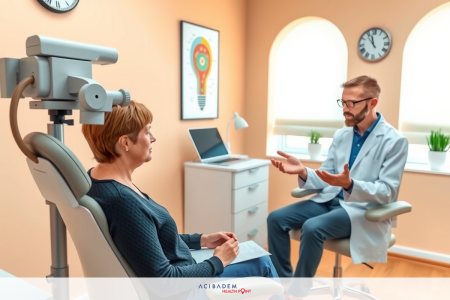Eye Graves’ Disease – Symptoms & Care
Eye Graves’ Disease – Symptoms & Care Eye Graves’ disease is a health problem linked to an autoimmune disorder. It can cause eye issues. These include bulging eyes, seeing double, and eyes that itch a lot.
Spotting the signs early is very important. With quick action, the effects can be controlled. This helps the patient live a better life. Learning about the right care and treatments is key to dealing with this disease.
This article is here to help. We will look at the symptoms, early signs, and ways to care for Eye Graves’ disease.
Understanding Eye Graves’ Disease
Eye Graves’ disease is also called thyroid eye disease. It goes beyond just the thyroid gland. It mainly affects the tissues around the eyes. This can cause many symptoms that make life hard. Knowing how this disease works is important to help those with it.
What is Graves’ Disease?
Graves’ disease is a problem where the immune system attacks the thyroid. This makes the thyroid too active. Because the thyroid is so active, it makes too many hormones. These high hormone levels change many things in the body. For example, they affect how fast you use energy, your heart rate, and your body temperature. But Graves’ disease doesn’t only touch the thyroid. It also affects other body parts.
How Does Graves’ Disease Affect the Eyes?
Graves’ disease affects the eyes in a big way. It can cause problems like bulging eyes and double vision. This happens when the immune system attacks the tissues around the eyes. It makes them inflamed and swollen. These issues can cause from a little discomfort to problems seeing. Severe cases might even harm the optic nerve if not treated.
It’s still being studied why the eyes are so affected by this disease. But, we do know the swelling and inflammation around the eyes are a big part of it. This makes the eyes bulge out and can cause problems like seeing double.
Common Symptoms of Eye Graves’ Disease
It’s important to know the common signs of Eye Graves’ disease. This issue mostly affects the eyes and shows certain signs. Let’s look at these key symptoms that can show up.
Bulging Eyes (Exophthalmos)
One key sign is bulging eyes, known as Exophthalmos. It happens because the tissues and muscles behind the eyes swell. This can make closing the eyes hard. It causes problems like dry eyes or infection.
Double Vision (Diplopia)
Double vision, or Diplopia, is also a major symptom. It happens when the eyes don’t align well because of swelling. This leads to seeing a fuzzy image. It can make daily tasks hard but can be helped with special glasses or surgery.
Eye Irritation and Redness
Eye irritation and redness are common in this condition. They’re often caused by high eye pressure and cornea exposure. This leads to a feeling like something is in the eye, and the eyes can be very red. It gets worse with wind or bright light.
| Symptom | Description | Potential Complications |
|---|---|---|
| Exophthalmos | Bulging of the eyes due to tissue swelling | Dryness, corneal exposure, infection |
| Diplopia | Double vision caused by eye misalignment | Difficulty with daily tasks, need for corrective measures |
| Eye Irritation and Redness | Inflammation leading to discomfort and visible redness | Constant discomfort, sensitivity to wind/light |
Identifying Early Signs of Graves’ Ophthalmopathy
Finding eye problems Graves disease early can help a lot. You may feel like you have sand in your eyes. This makes your eyes feel uncomfortable all the time.
Early sign of Graves ophthalmopathy may be swollen eyes. This can make your eyes look puffy. It might seem like you are tired or have allergies. If the puffiness doesn’t go away, see a doctor.
Early signs of Graves ophthalmopathy also include changes in vision. You might see things blurry, have double vision, or find light too bright. Getting your vision checked right away can really help manage the disease.
If you cry a lot or your eyes are super dry, it could be a sign. Problems with tears can have serious effects. This is why it’s so important to catch it early.
Here’s a quick list of early signs to watch for:
| Indicator | Description |
|---|---|
| Discomfort/Gritty Sensation | Feels like sand or particles under the eyelids causing irritation. |
| Swelling Around Eyes | Persistent puffiness and fullness that may resemble fatigue. |
| Vision Changes | Includes blurriness, double vision, and light sensitivity. |
| Tearing/Dry Eyes | Imbalances in tear production leading to excessive dryness or watering. |
The Importance of Timely Diagnosis
It’s vital to catch Graves’ eye disease early for the best care. Graves disease eye diagnosis relies on detailed exams and tests. They show how bad the problem is.
Medical History and Physical Exam
First, doctors check your history and do a physical exam. They’ll ask about your health and family. Then they look closely at your eyes for any odd signs.
Diagnostic Imaging and Blood Tests
Tests like CT scans and blood checks are vital. They help doctors see the eye’s inside and blood’s health. Thyroid eye disease tests show:
- CT Scan or MRI: These find eye muscle and fat problems, and optic nerve issues. They give clear pictures of what’s wrong.
- Thyroid Function Tests: These blood tests check thyroid hormone levels. They see if a bad thyroid is hurting your eyes.
- Antibody Tests: These find certain antibodies linked to Graves’ disease.
Using all these tests helps doctors know exactly what’s happening. This makes the treatment right away.
Treatment Options for Graves’ Eye Disease
Treatment for Graves’ Eye Disease, or Thyroid Eye Disease, changes based on how serious it is. It also depends on how fast it’s getting worse. Let’s look at the main ways to help with the symptoms and keep your eyes healthy.
Medications
Eye Graves’ Disease – Symptoms & Care Doctors often start with medicines to deal with the swelling and pain of Graves’ Eye Disease. They might use drugs like prednisone to lower tissue swelling. Sometimes, drugs that slow down the immune system are used to stop it from harming the eyes more.
Radiation Therapy
For some, radiation might be needed to calm down an overactive immune system. It’s a treatment that targets the immune system in the eyes. This can be very helpful, especially when used with other medicines.
Surgical Interventions
If things get really bad, surgeries could be on the table. Orbital decompression surgery is done to make room for swollen tissues and take pressure off the optic nerve. Eyelid surgeries can make your eyelids work better, and strabismus surgery fixes double vision by moving the eye muscles.
Managing Eye Problems Associated with Graves’ Disease
If you have Graves’ disease, you might face eye issues like dryness, irritation, and strain. It’s important to manage these symptoms. This helps you feel better and stops more problems. Here are some simple tips to make things easier.
Protection Against Dryness and Irritation
Dry eyes are a big concern for people with Graves’ eye disease. You can fight this with some easy steps:
- Use artificial tears or lubricating eye drops to keep the eyes moist.
- Install a humidifier in your home to maintain adequate moisture levels in the air.
- Wear wrap-around sunglasses to protect your eyes from wind and harsh weather conditions.
- Stay hydrated by drinking plenty of water throughout the day.
Tips for Reducing Eye Strain
Eye strain is a major issue for those with Graves’ disease-caused dry eyes. Follow these tips to ease the discomfort:
- Follow the 20-20-20 rule: every 20 minutes, take a 20-second break to look at something 20 feet away.
- Ensure your computer screen is at eye level and approximately 20 to 26 inches from your eyes.
- Adjust lighting to reduce glare and use anti-glare screens when possible.
- Perform simple eye exercises such as blinking frequently and rolling your eyes to combat strain.
Adding these measures to your day can make dealing with Graves’ eye disease easier. Be active in keeping your eyes from getting too dry or strained. This will not only make you feel better but also keep your eyes healthy.
Preventive Measures and Lifestyle Changes
Eye Graves’ Disease – Symptoms & Care Making changes to how you live can really help with Graves’ disease. This is especially true for your eyes. By eating well and living better every day, you can make the disease less of a problem. This helps your whole eye health.
It’s super important to eat foods with lots of vitamins and minerals. Vitamins A and C, plus Omega-3, are great for your eyes. Add things like spinach, oranges, and salmon to your diet. This boosts your eye health big time.
- Vitamin A: Keeps your eyesight sharp and healthy.
- Vitamin C: Stops damage to your eyes by working as an antioxidant.
- Omega-3 Fatty Acids: Cuts down on swelling and dry eyes.
Being active also is a big help. It gets your blood flowing better. This brings more nutrients to your eyes. It keeps them working like they should.
Cutting down on stress is key too. Try calm activities like yoga or meditation. These can keep your symptoms from getting worse. They help keep your eyes healthy.
Not smoking or drinking too much is just as important. These can make your symptoms worse. Avoiding them helps keep your eye health plan on track.
Don’t forget your eye check-ups. Seeing your eye care doctor regularly is very important. They can catch any problems early. Then, they can help you adjust your plan as needed.
| Preventive Measures | Benefits |
|---|---|
| Balanced Diet | Provides essential nutrients for eye health |
| Regular Exercise | Improves blood circulation to the eyes |
| Stress Management | Reduces symptom exacerbation |
| Avoiding Smoking and Excess Alcohol | Prevents aggravation of symptoms |
| Regular Eye Check-ups | Early detection and management of complications |
The Role of the Acibadem Healthcare Group in Eye Care
Acibadem Healthcare Group is a top name in eye care, especially for Graves’ disease patients. They are known for their cutting-edge treatments and how well they care for patients.
Pioneering Treatments and Patient Care
Acibadem Healthcare Group leads in using advanced eye treatment for Graves’ disease patients. They use the latest technology and make personalized care plans. This ensures the best results.
Treatments range from simple procedures to advanced surgeries. They also help reduce inflammation and improve eye function.
Success Stories and Patient Testimonials
Many patients share how Acibadem healthcare changed their lives. After getting treatment, they saw big improvements in their eye health and quality of life. Their stories show how well Acibadem takes care of its patients.
| Aspect | Details |
|---|---|
| Innovations | Latest technologies and non-invasive procedures for eye care |
| Patient Care | Personalized treatment plans and empathetic patient support |
| Success Rates | High success stories and improved patient outcomes |
Long-term Outlook for Patients with Eye Graves Disease
Aiming to manage Graves ophthalmopathy for a long time, new understanding and treatments help. Some patients might get better for a while, while others need ongoing care.
Looking ahead, treating Graves ophthalmopathy over the long term is key. It depends on a few important things:
- Regular Follow-up Care: Doctors checking in often helps tweak treatment to what the patient needs.
- Medication Management: It’s key to keep an eye on how well the medicine works and any side effects.
- Lifestyle Adjustments: Changing your diet and habits can really help in managing the illness.
The long-term outlook changes with how bad the condition was at first, how treatment works for that person, and how well they keep up with check-ups. For many, steady success and managing symptoms are very doable with a strong plan.
| Management Aspect | Long-term Strategy |
|---|---|
| Medication | Regular review and adjustments by specialists |
| Lifestyle Modification | Adopting supportive dietary and habitual changes |
| Regular Checkups | Scheduled follow-ups for continuous monitoring |
Being active in managing Graves ophthalmopathy leads to better life quality and symptom control over time.
Emotional and Psychological Support for Patients
Living with Eye Graves’ disease can be tough. It affects the body and mind. Getting the right support is key for patients.
Coping with the Disease
Handling Eye Graves’ disease daily needs strength. It’s good to do things that make your mind strong. Mindfulness, keeping life in balance, and knowing about the condition help a lot.
- Mindfulness: It keeps patients stress-free by focusing on the moment.
- Balanced Lifestyle: Regularly exercising, eating well, and sleeping enough boosts your health.
- Education: Knowing about the disease gives a sense of control.
Resources and Support Groups
It’s great to connect with people facing Eye Graves’ disease. There are many Graves disease support groups and resources. They offer online and in-person help.
- Online Communities: Websites like the Graves’ Disease and Thyroid Foundation let patients talk and exchange advice.
- Local Support Groups: Meeting people in-person through support groups can also help a lot.
- Professional Counseling: Talking to a therapist can offer personalized support.
Using these resources makes life better for patients. They help avoid feeling alone in dealing with Eye Graves’ disease.
Consultation and Follow-up Care with Your Ophthalmologist
Eye Graves’ Disease – Symptoms & Care Seeing your eye doctor often is key to dealing with Eye Graves’ Disease well. These check-ups help your doctor see how the disease is going. They can tweak your treatment too, and take care of any new eye issues.
These visits often include deep looks at your eyes, special pictures, and blood tests. Your eye doctor will also check how well your treatment is working. If needed, they’ll change things to make you better.
It’s very important to talk with your doctor during these visits. If you’re feeling off or see new signs, let them know. This can help keep your treatment plan on track. Regular visits don’t just help your body; they can make you feel better too.
FAQ
What is Graves' Disease?
Graves' disease is when the body attacks the thyroid gland by mistake. This causes the gland to make too many hormones. It can lead to trouble in the eyes, like bulging eyes or eye diseases.
How Does Graves' Disease Affect the Eyes?
Graves' disease affects the area around the eyes. It can make the eyes bulge out or cause double vision. Other signs are eye irritation, redness, and swelling. It's important to treat to avoid vision problems.
What are the Common Symptoms of Eye Graves' Disease?
The key signs are bulging eyes, double vision, and eye redness. People may feel eye irritation, dryness, and see some swelling. Finding these signs early helps with treatment.













